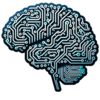
Back تطبيقات الذكاء الاصطناعي Arabic Aplicacions de la intel·ligència artificial Catalan Anwendungen künstlicher Intelligenz German Aplicaciones de la inteligencia artificial Spanish کاربردهای هوش مصنوعی Persian Applications de l'intelligence artificielle French कृत्रिम बुद्धिके प्रयोग Hindi Արհեստական բանականության կիրառությունները Armenian Toepassingen van kunstmatige intelligentie Dutch ଆର୍ଟିଫିସିଆଲ ଇଣ୍ଟେଲିଜେନ୍ସର ପ୍ରୟୋଗ OR
This article has multiple issues. Please help improve it or discuss these issues on the talk page. (Learn how and when to remove these messages)
|
| Part of a series on |
| Artificial intelligence (AI) |
|---|
Artificial intelligence (AI) has been used in applications throughout industry and academia. In a manner analogous to electricity or computers, AI serves as a general-purpose technology. AI programs are designed to simulate human perception and understanding. These systems are capable of adapting to new information and responding to changing situations. Machine learning has been used for various scientific and commercial purposes[1] including language translation, image recognition, decision-making,[2][3] credit scoring, and e-commerce.
- ^ Brynjolfsson, Erik; Mitchell, Tom (22 December 2017). "What can machine learning do? Workforce implications". Science. 358 (6370): 1530–1534. Bibcode:2017Sci...358.1530B. doi:10.1126/science.aap8062. PMID 29269459.
- ^ Shin, Minkyu; Kim, Jin; van Opheusden, Bas; Griffiths, Thomas L. (2023). "Superhuman artificial intelligence can improve human decision-making by increasing novelty". Proceedings of the National Academy of Sciences. 120 (12): e2214840120. arXiv:2303.07462. Bibcode:2023PNAS..12014840S. doi:10.1073/pnas.2214840120. PMC 10041097. PMID 36913582.
- ^ Chen, Yiting; Liu, Tracy Xiao; Shan, You; Zhong, Songfa (2023). "The emergence of economic rationality of GPT". Proceedings of the National Academy of Sciences. 120 (51): e2316205120. arXiv:2305.12763. Bibcode:2023PNAS..12016205C. doi:10.1073/pnas.2316205120. PMC 10740389. PMID 38085780.
